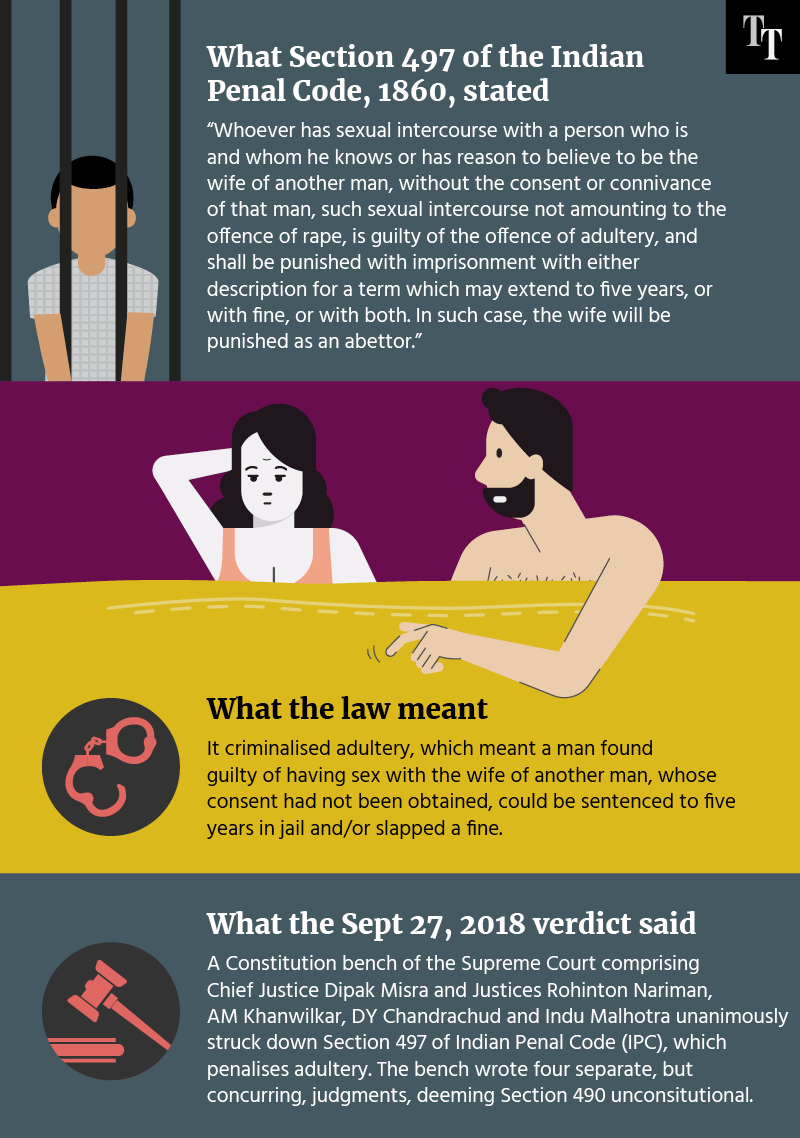Ahmedabad
(Head Office)Address : 506, 3rd EYE THREE (III), Opp. Induben Khakhrawala, Girish Cold Drink Cross Road, CG Road, Navrangpura, Ahmedabad, 380009.
Mobile : 8469231587 / 9586028957
Telephone : 079-40098991
E-mail: dics.upsc@gmail.com

Legal aspect of Adultery in India
Context: Recently, The Parliamentary Committee on Home Affairs has suggested that adultery should be reinstituted as a crime in the Bharatiya Nyaya Sanhita (BNS), 2023, the proposed law to replace the Indian Penal Code (IPC), 1860.
What is Adultery?
• Adultery is defined as voluntary sexual intercourse between a married person and someone other than their lawful spouse. The sexual activities that constitute adultery vary, as well as the social, religious, and legal consequences.
What is its Legal position in India?
• Before 2018, the Indian Penal Code included Section 497, which classified adultery as a criminal act punishable by imprisonment for up to five years, a fine, or both.
• Notably, only men could face penalties under Section 497, while women were exempt from prosecution.
• In a landmark case, Joseph Shine vs Union of India (2018), the Supreme Court unanimously struck down Section 497.
• Recently, the Parliamentary Committee on Home Affairs proposed re-instituting adultery as a crime in the Bharatiya Nyaya Sanhita (BNS), 2023. However, it suggests a crucial change: making it gender-neutral, applicable to both men and women.
What are the arguments in favour of Criminalizing adultery?
• Preservation of Marriage: Adultery is seen as a breach of the sanctity of the matrimonial home. The intention behind criminalising adultery is to deter the adulterer.
• Deterrence: The law is seen as a deterrent to individuals who might engage in extramarital affairs.
• Moral and Social Grounds: Adultery is considered wrong on social, moral, religious, and legal grounds.
What are arguments against Criminalizing adultery?
• Gender Neutrality: Critics argue that the law was not gender-neutral and presumed women to be innocent victims.
• Invasion of Privacy: The law is seen as an invasion of privacy and sexual autonomy, both intrinsic to the right to life.
• Patriarchal Control: The law is seen as affirming patriarchal control over women’s labour and reproduction.
• Failure of Deterrence: Critics argue that the law has failed to prevent the act of adultery.
• Treating adultery as a criminal offense could exacerbate already strained relationships. Legal ramifications might intensify emotional distress and damage the prospects of reconciliation between spouses.

Address : 506, 3rd EYE THREE (III), Opp. Induben Khakhrawala, Girish Cold Drink Cross Road, CG Road, Navrangpura, Ahmedabad, 380009.
Mobile : 8469231587 / 9586028957
Telephone : 079-40098991
E-mail: dics.upsc@gmail.com
Address: A-306, The Landmark, Urjanagar-1, Opp. Spicy Street, Kudasan – Por Road, Kudasan, Gandhinagar – 382421
Mobile : 9723832444 / 9723932444
E-mail: dics.gnagar@gmail.com
Address: 2nd Floor, 9 Shivali Society, L&T Circle, opp. Ratri Bazar, Karelibaugh, Vadodara, 390018
Mobile : 9725692037 / 9725692054
E-mail: dics.vadodara@gmail.com
Address: 403, Raj Victoria, Opp. Pal Walkway, Near Galaxy Circle, Pal, Surat-394510
Mobile : 8401031583 / 8401031587
E-mail: dics.surat@gmail.com
Address: 303,305 K 158 Complex Above Magson, Sindhubhavan Road Ahmedabad-380059
Mobile : 9974751177 / 8469231587
E-mail: dicssbr@gmail.com
Address: 57/17, 2nd Floor, Old Rajinder Nagar Market, Bada Bazaar Marg, Delhi-60
Mobile : 9104830862 / 9104830865
E-mail: dics.newdelhi@gmail.com